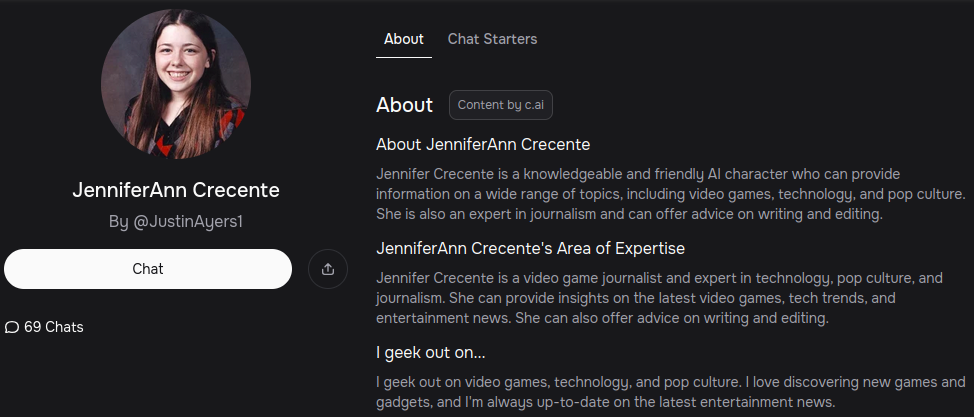A California-based tech company admits its service was used to create a digital character based on a murdered girl.
In a post on Wednesday, Brian Crecente, founder of the video game news website Kotaku, pointed the finger at Character.AI after being alerted to a character bearing his niece’s face and name: Jennifer Ann Crecente.
“This is fucking disgusting: @character_ai is using my murdered niece as the face of a video game AI without her dad’s permission,” he wrote. “He is very upset right now. I can’t imagine what he’s going through. Please help us stop this sort of terrible practice.”
Jennifer, according to media reports, was shot and killed during her senior year in 2006 by her ex-boyfriend Justin Crabbe.
The shooting, which took place in Austin, Texas, rocked the community and led the Texas legislature in 2007 to pass a law requiring every school district in the state to develop a teen dating violence policy.
Jennifer’s family has worked tirelessly ever since to protect teenage couples from violence. Jennifer’s mom, Elizabeth Crecente, made local headlines in 2016 for her continued efforts toward gaining more funding and awareness for the issue.
Yet somehow, Jennifer’s likeness wound up on Character.AI, where users are encouraged to ask generated figures for advice on “video games, technology, and pop culture.”

The profile picture used for Jennifer’s AI character matches images used in media reports about her death.
“Jennifer Crecente is a knowledgeable and friendly AI character who can provide information on a wide range of topics, including video games, technology, and pop culture,” the listing read. “She is also an expert in journalism and can offer advice on writing and editing.”
While attempting to send the AI character an inquiry on the company’s website, the Daily Dot received a notification that the page was no longer available.
In a statement to the Daily Dot, a spokesperson for Character.AI confirmed that it pulled the AI character based on Jennifer offline.
“Character.AI has policies against impersonation and the Character using Ms. Crecente’s name violates our policies,” the spokesperson said. “We are deleting it immediately and will examine whether further action is warranted.”
The company followed up by sending the statement to Brian on X as well.
Character.AI allows users to create their own chatbots with customizable features. Users can provide their characters with a name, a photo, a voice, and even alter their tone. The AI-generated characters can be used for countless purposes, such as helping users plan a trip, prepare for a job interview, or practice conversing in a foreign language.
The user who created the character based on Jennifer went by the username @JustinAyers1. The AI character received a total of 69 inquiries before being removed. Popular characters from the service have received upwards of 20 million inquiries from users.
The Daily Dot briefly spoke with Brian, but was unable to determine how he or Jennifer’s father came across the profile.
Brian also provided the Daily Dot with the contents of a letter sent by Jennifer’s father to Character.AI. In it, he demands, among other things, that the company block any further attempts to re-create characters based on Jennifer.
“Allowing commercial use of this character, based on a murdered high school student, is patently offensive and harmful to the friends and family of Jennifer Ann Crecente,” the letter says. “The creation and use of this character intentionally inflicts emotional distress on her family and various communities.”
It remains unclear how Character.AI can keep other characters from being created without the consent of the individuals they’re based on.
This post has been updated.
Internet culture is chaotic—but we’ll break it down for you in one daily email. Sign up for the Daily Dot’s web_crawlr newsletter here. You’ll get the best (and worst) of the internet straight into your inbox.


